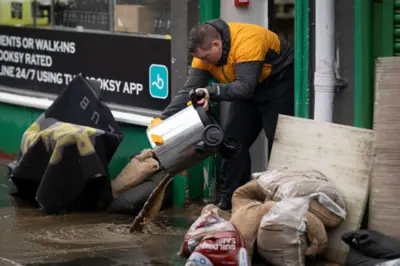We've updated our Privacy and Cookies Policy
We've made some important changes to our Privacy and Cookies Policy and we want you to know what this means for you and your data.
Fracking contamination downplayed
Image source, Getty Images
Top Stories
- Author, Jonathan Amos
- Role, Science correspondent, ґуПуґ«ГЅ News, Vancouver
The concern that hydraulic fracturing of shale formations to extract natural gas is contaminating groundwater is overstated, claims a new report.
Researchers reviewing the available data in the US found nothing to suggest "fracking" had a unique problem.
Rather, they suggest the contamination events that do arise are just as likely to afflict other types of oil and gas drilling operations.
The claims were made at the in Vancouver, Canada.
Charles "Chip" Groat, associate director of Energy Institute at the University of Texas at Austin, led the study.
Top Stories
"The bottom line conclusion of our study is that in the states we investigated, we found no evidence that hydraulic fracturing itself, the practice of fracturing the rocks, had contaminated shallow groundwater," he told the American Association for the Advancement of Science meeting.
Flammable liquids
Top Stories
Fracking has been hailed as an energy game-changer, a stimulation technique that can release vast new reserves of natural gas.
It involves driving high-pressure fluids and sand into deep dense rocks to break them apart.
The practice has been used vertically since the 1950s but recent innovations have made it possible to also run extensive horizontal wells, opening up previously unreachable gas resources on a large scale.
Fracking, though, has become highly controversial, with claims that the pressurised fluids can find their way into water courses and drinking supplies, and also trigger small earthquakes.
There are even examples of householders who live near fracking operations being able to ignite gas coming through their water taps.
The Energy Institute team did not look at all of these issues in detail, preferring in the first instance to concentrate on the groundwater contamination reports.
Their study looked at three prominent shale plays - the Barnett Shale in North Texas, the Marcellus Shale in Pennsylvania, New York and portions of Appalachia, and the Haynesville Shale in western Louisiana and northeast Texas.
Their review of the data indicated that many problems ascribed to hydraulic fracturing were actually related to processes common to all oil and gas drilling operations.
Such problems included casing failures and poor cement jobs that allowed fluids near the surface to break out of the well to pollute groundwater.
Above-ground spills or the mishandling of wastewater were also cited as causes.
This had to be addressed through tight regulation and enforcement, said Dr Groat.
"Poor practices are poor practices and they need to be identified and need to be penalised so they are not carried on beyond a reasonable point," he told ґуПуґ«ГЅ News.
Dr Groat said far more research on hydraulic fracturing was needed, and his Energy Institute planned now to take a closer look at the other concerns such as any increased earthquake risk.
This is an interest of John Clague, an earth sciences professor from Simon Fraser University, who is also present here at the AAAS.
He has looked at the documented observations of spatial and temporal coincidences between fracking and earthquakes east of the Rocky Mountains near Fort Nelson, British Columbia.
"To my knowledge, the Horn River area of northeastern British Columbia - which is an example in my talk of where fracking coincides with earthquakes - is not particularly earthquake prone," he says.
"Yet there are documented observations in this area of fluid pressures causing rocks that are near the threshold of failure to slip, triggering earthquakes. Crustal rocks can be brought to the point of failure by natural forces."
Jonathan.Amos-INTERNET@bbc.co.uk and follow me on
Top Stories
More to explore
Most read
Content is not available








